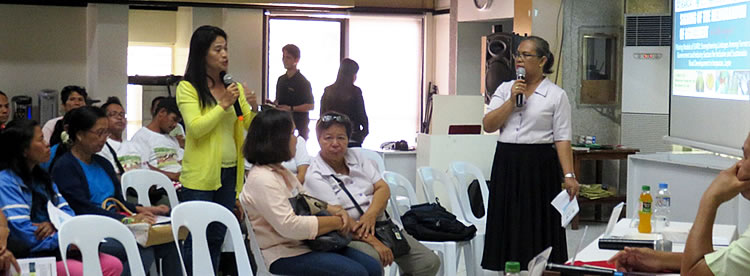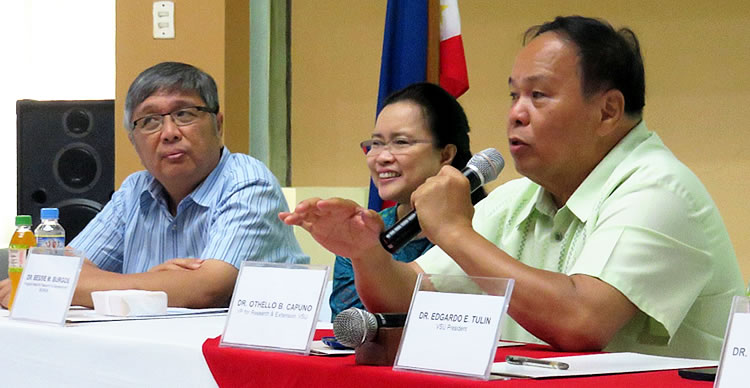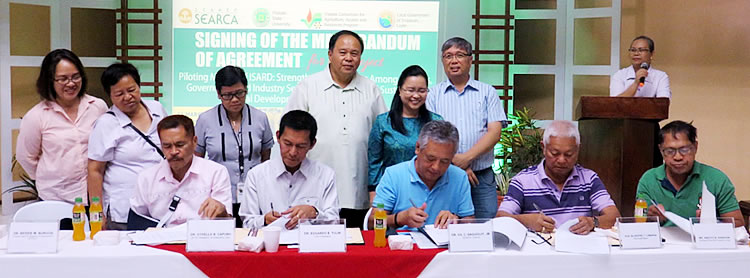Inopacan Mayor Silvestre T. Lumarda gratefully welcomed the project as a hope-reviving opportunity for Inopacan and its constituents. He recognized the need to strengthen the linkages of the farmers, government and the industry sector for inclusive and sustainable development, and encouraged farmers to get involved and become competitive in all the development projects undertaken by the municipality, especially the ISARD Piloting project.
Specifically, the ISARD Piloting project in Inopacan will focus on the production of vegetables, jackfruit and cooking bananas; value-adding activities and processing considering market opportunities; tilapia culture; and rainforestation. This is part of SEARCA’s contribution to the post-Yolanda rehabilitation efforts in Leyte wherein these commodities will be provided with much-needed production and marketing assistance to boost the municipality’s agri-aqua industry. To promote environmental sustainability and safeguard the already-fragile and still-recovering ecosystem, a rainforestation project will be implemented in the upland grassland areas. Targeted areas are the upland grassland of Brgy. Linao for rainforestation, and Brgy. Cabulisan for expanded vegetable production.
Mayor Lumarda was joined by SEARCA Director Dr. Gil C. Saguiguit, Jr., and VSU President and Chair of the ViCAARP Regional Research and Development Coordinating Council Dr. Edgardo E. Tulin in the signing of the MOA. Representatives from the regional offices of DA-ATI, Director Vilma M. Patindol and DTI, Mrs. Rebecca Macabenta – Cormanes, were also present. Both partners and representatives alike promised to give full support and exert maximum effort for the success of this endeavor.
Prof. Rolando T. Bello, the Overall Coordinator of the ISARD Program, presented the general overview of the project. It was complemented by a more detailed and site-specific presentation of the project by Dr. Jose L. Bacusmo, the On-site Project Coordinator from VSU. Meanwhile, Dr. Tulin pledged to support the project holistically to improve the poverty situation of the province, and partly, the region as well. He acknowledged the need to address Region VIII’s problem of being the poorest in the country, through this ISARD pilot project by strengthening capacities of communities.
Lastly, Dr. Saguiguit’s message focused on a much bigger and longer-term impact of the project, not only in Inopacan but in the Philippines and the Southeast Asian region as well. He mentioned that the learnings from this project will be applied to other rural communities in Southeast Asia. He ended by highlighting the potentials of Inopacan and its stakeholders and by challenging them to participate and work together for the success of the project.
Joining the farmers in witnessing the activity are Mr. Anecito Asencion, Municipal Agriculturist of Inopacan, Dr. Othello Capuno, Vice President for Research and Extension of VSU, and Dr. Bessie M. Burgos, Research and Development Program Head of SEARCA.
One of the major concerns pointed out by the farmers during the event was the very low prices of jackfruit, vegetables and other key commodities in Inopacan during peak production resulting to low income. Some of the options discussed to address this problem include value-adding activities such as processing, and partnerships with major processors that can absorb expanded production of these commodities. (Henry M. Custodio and Angelic M. Reglos)



